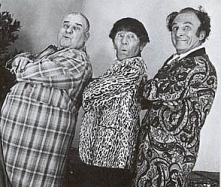The Three Stooges were an American vaudeville and comedy act of the early to mid?20th century best known for their numerous short subject films. Their hallmark was physical farce and extreme slapstick. In films, the stooges were commonly known by their first names: "Moe, Larry, and Curly" and "Moe, Larry, and Shemp," among other lineups. The film trio was originally composed of Moe Howard, brother Shemp Howard and longtime friend Larry Fine. Curly Howard replaced brother Shemp, who later returned when Curly suffered a debilitating stroke in 1946.
After Shemp's death in 1955, he was replaced by comedian Joe Besser, after the use of stuntman Joe Palma to record several "Shemp" shorts after his death. Eventually Joe "Curly-Joe" DeRita replaced Joe Besser. Larry suffered a serious stroke in 1970, and was unable to continue performing. Emil Sitka, a longtime actor in Stooge comedies, was contracted to replace Larry, but no film was ever made with him in the role, although publicity photographs exist of him with his hair combed similarly to Larry's, posing with Moe and Curly-Joe. However, Larry's paralyzing stroke in 1970 effectively marked the end of the act. He died in January 1975. Moe died of cancer a few months later.
The Three Stooges started in 1925 as part of a raucous vaudeville act called 'Ted Healy and His Stooges'. In the act, lead comedian Healy would attempt to sing or tell jokes while his noisy assistants would keep "interrupting" him. Healy would respond by verbally and physically abusing his stooges. Brothers Moe and Shemp were joined later that year by violinist-comedian Larry Fine, and Fred Sanborn joined the group as well.
In 1930, Ted Healey and His Stooges, including Sanborn, appeared in their first Hollywood feature film: Soup to Nuts, released by Fox Film Corporation. The film was not a success with the critics, but the Stooges' performances were considered the highlight and Fox offered the trio a contract without Healy. This displeased Healy, who told studio executives that the Stooges were his employees. The offer was withdrawn, and after Howard, Fine and Howard learned of the reason, they left Healy to form their own act, which quickly took off with a tour of the theatre circuit. Healy attempted to stop the new act with legal action, claiming they were using his copyrighted material. There are accounts of Healy threatening to bomb theaters if Howard, Fine and Howard ever performed there, which worried Shemp so much that he almost left the act; reportedly, only a pay raise kept him on board. Healy tried to save his act by hiring replacement stooges, but they were inexperienced and not as well-received as their predecessors. In 1932, with Moe now acting as business manager, Healy reached a new agreement with his former Stooges, and they were booked in a production of Jacob J. Shubert's The Passing Show of 1932. During rehearsals, Healy received a more lucrative offer and found a loophole in his contract allowing him to leave the production. Shemp, fed up with Healy's abrasiveness, decided to quit the act and found work almost immediately, in Vitaphone movie comedies produced in Brooklyn, New York.


